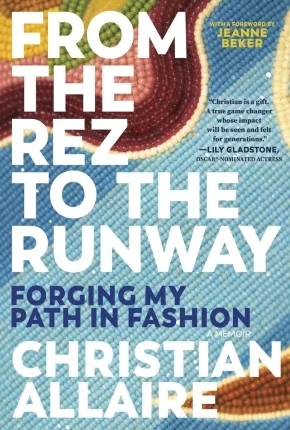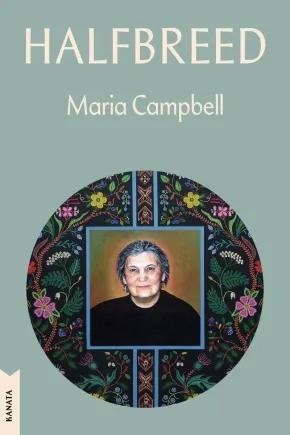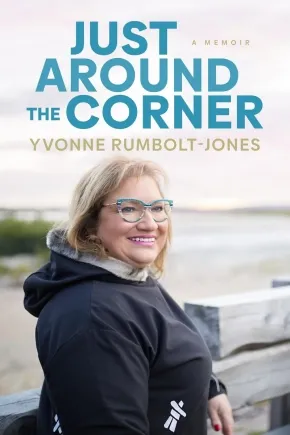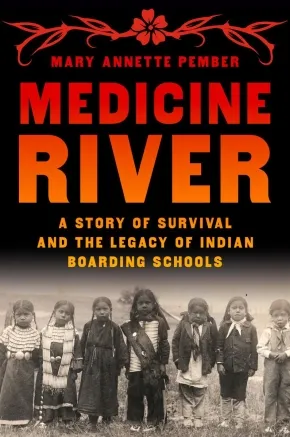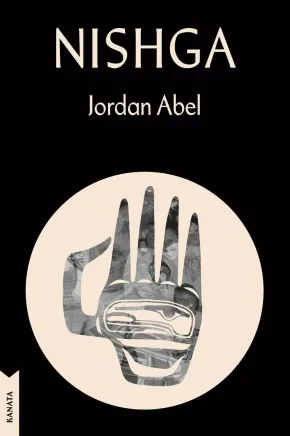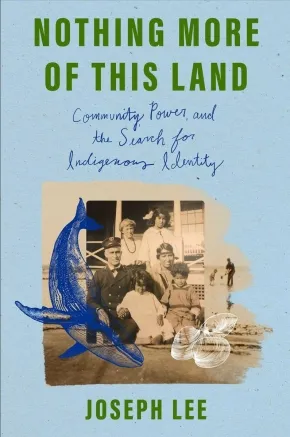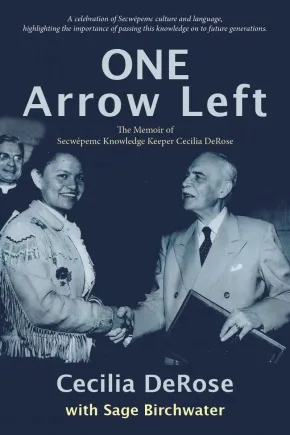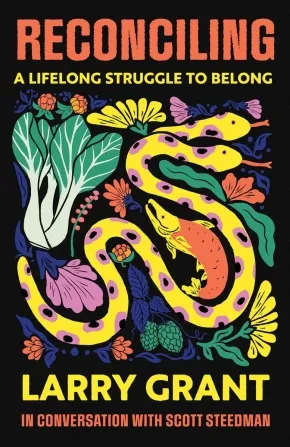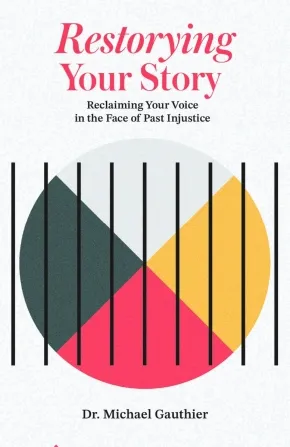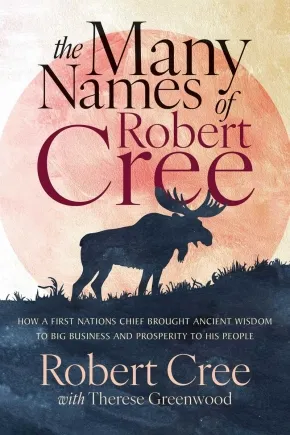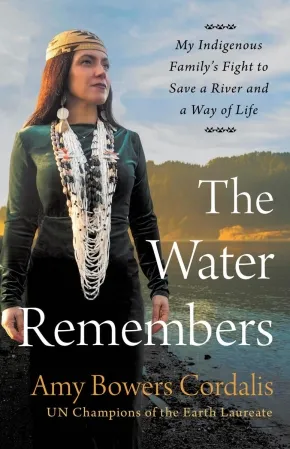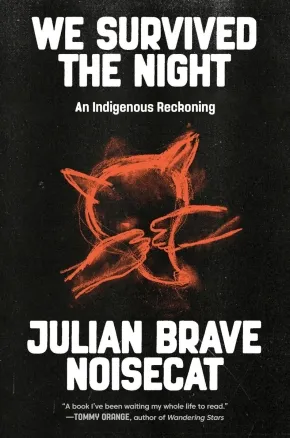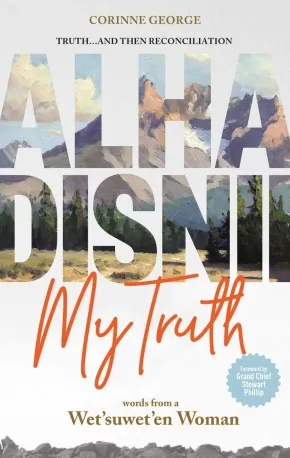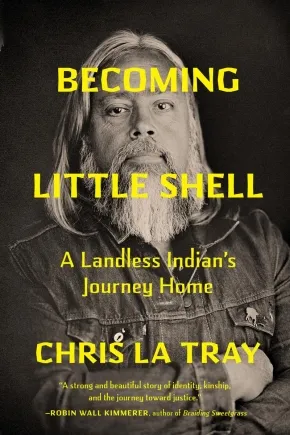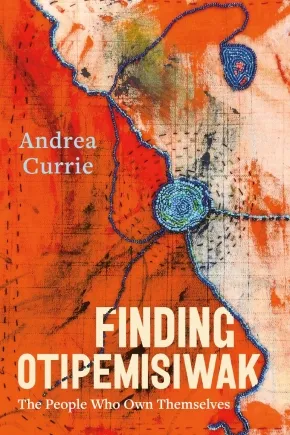Autobiographies
Synopsis:
Growing up on the Nipissing First Nation reserve in Northern Ontario, Christian Allaire wanted to work in the fashion industry, a future that seemed like a remote, and unlikely, dream
He was first introduced to style and design through his culture’s traditional Ojibwe powwow regalia—ribbon skirts, beaded belts, elaborate headdresses. But as a teenager, he became transfixed by the high-fashion designs and runway shows that he saw on Fashion Television and in the pages of Vogue.
His unwavering interest in fashion led him to complete a journalism degree so he could pursue his goal of becoming a full-time fashion writer. After landing his first big magazine job in New York City, Allaire found himself working at the epicentre of the international fashion industry. His dream had come true. Yet he soon realized the fashion world—and his place in it—wasn’t always quite as glamorous as he imagined it would be.
From grinding as an unpaid intern, to becoming a glitzy (but overworked) fashion editor, Allaire writes with feeling about the struggle to find his place—and community—in the highly exclusive world of fashion. And he recounts, with great candour, the difficulty of balancing his ambitions with the often-inaccurate perceptions—including his own—of his culture’s place in the realm of fashion.
Full of joy, honesty, adversity, and great clothes, From the Rez to the Runway is a gripping memoir about how to achieve your dreams—and elevate others—while always remaining true to yourself.
Reviews
“Christian is a gift. He embodies the precious intersection between arts and advocacy, and is a truly grounded and inspired human being. In having such a curated, unique and sharp eye for both classic and cutting edge design, coupled with an unshakable commitment to elevating Indigenous designers, he has carved a necessary space which elevates Indian Country and the world of fashion as a whole. A true game changer whose impact will be seen and felt for generations.” — Lily Gladstone, Oscar-nominated actor
Funny, honest and utterly charming, From the Rez to the Runway lends the cliche fashion editor origin story a refreshing new perspective. With a true sense of passion and wide-eyed wonder, Christian Allaire pursues his personal quest for creativity, purpose and self-discovery and finds that staying true to one’s self brings the greatest rewards. Brimming with moving family memories from the reservation and hilarious fashion misadventures alike, the book is a must-read for all the so-called outsiders and misfits who’ve ever dared to follow their dreams. — Chioma Nnadi, Head of Editorial Content, British Vogue
From beadwork to Burberry, Christian Allaire is a force in fashion. He paints a portrait of a complicated industry rarely seen behind the scenes — let alone traversed by Indigenous writers. In this compelling and inspiring memoir, Allaire details how he carries community with him through every glass ceiling he shatters. His work, and this memoir, are a triumph. After all, ‘Don’t mess with a rez kid.’ — Devery Jacobs, Filmmaker and Actor, Reservation Dogs
There is a new generation of Fashion Transformers and Christian Allaire is leading the movement. Allaire has been chosen by spirit to shine a light on Indigenous Fashion and Art, and he has done so at the highest levels, from New York to Paris, and all around the world. He is a door opener for the truth, power, and beauty of true fashion and its creators. — Kelly Cutrone, founder of People’s Revolution and New York Times bestselling author
Additional Information
272 pages | 6.00" x 9.00" | Paperback
Synopsis:
A new, fully restored edition of the essential Canadian classic.
An unflinchingly honest memoir of her experience as a Métis woman in Canada, Maria Campbell's Halfbreed depicts the realities that she endured and, above all, overcame. Maria was born in Northern Saskatchewan, her father the grandson of a Scottish businessman and Métis woman--a niece of Gabriel Dumont whose family fought alongside Riel and Dumont in the 1885 Rebellion; her mother the daughter of a Cree woman and French-American man. This extraordinary account, originally published in 1973, bravely explores the poverty, oppression, alcoholism, addiction, and tragedy Maria endured throughout her childhood and into her early adult life, underscored by living in the margins of a country pervaded by hatred, discrimination, and mistrust. Laced with spare moments of love and joy, this is a memoir of family ties and finding an identity in a heritage that is neither wholly Indigenous or Anglo; of strength and resilience; of indominatable spirit.
This edition of Halfbreed includes a new introduction written by Indigenous (Métis) scholar Dr. Kim Anderson detailing the extraordinary work that Maria has been doing since its original publication 46 years ago, and an afterword by the author looking at what has changed, and also what has not, for Indigenous people in Canada today. Restored are the recently discovered missing pages from the original text of this groundbreaking and significant work.
Educator & Series Information
This book is part of the Kanata Classics series, which celebrates timeless books that reflect the rich and diverse range of voices in Canadian literature.
Additional Information
224 pages | 5.50" x 8.23" | Paperback
Synopsis:
Just Around the Corner is the story of Member of Parliament for Labrador, Yvonne Rumbolt-Jones, a woman from a northern community who broke free of her geographic and political isolation to embrace opportunity.
Just Around the Corner is the story of Member of Parliament for Labrador Yvonne Rumbolt-Jones, a woman from a northern community who broke free of geographic and political isolation to embrace opportunity. An intimate memoir from the longest-serving female politician in Newfoundland and Labrador, Just Around the Corner uncovers Rumbolt-Jones's strength as a survivor as well as her determination and courage through both her private life and her political life. She reveals her early years of dealing with child sexual abuse and experiences with family alcoholism, and her challenges as an adult confronting personal grief and loss, the sexism, public scrutiny, and challenges of party politics, as well as being diagnosed with cancer-twice. Through it all, the thread of Rumbolt-Jones's love for Labrador and its people, and her hope and joy in working for the future of both shines through. She writes with confidence and candour about overcoming adversity and marginality to be elected to both the provincial House of Assembly and the national Parliament, where she has been a strong leader and voice for women, Indigenous peoples, and Canada's North. Her story is that of a woman who refused to let the scars of the past define her, but rather used them to help her grow and understand that while we may not control what harms us, we can control how we move forward.
Additional Information
304 pages | 5.50" x 8.25" | Paperback
Synopsis:
A sweeping and trenchant exploration of the history of Native American boarding schools in the United States, and the legacy of abuse wrought by them in an attempt to destroy Native culture and life.
From the mid-nineteenth century to the late 1930s, tens of thousands of Native children were pulled from their tribal communities to attend boarding schools whose stated aim was to "save the Indian" by way of assimilation. In reality, these boarding schools—sponsored by the U.S. government, but often run by various religious orders with little to no regulation—were a calculated attempt to dismantle tribes by pulling apart Native families. Children were beaten for speaking their Native languages; denied food, clothing, and comfort; and forced to work menial jobs in terrible conditions, all while utterly deprived of love and affection.
Amongst those thousands of children was Ojibwe journalist Mary Pember's mother, who was was sent to a boarding school in northern Wisconsin at age five. The trauma of her experience cast a pall over Pember's own childhood and her relationship with her mother. Highlighting both her mother's experience and the experiences of countless other students at such schools, their families, and their children, Medicine River paints a stark but hopeful portrait of communities still reckoning with the trauma of acculturation, religion, and abuse caused by the state. Through searing interviews and careful reporting, Pember traces the evolution and continued rebirth of Native cultures and nations in relation to the country that has been intent on eradicating them.
Reviews
“A devastating history. . . . Weaving into her narrative her own mother’s experiences . . . Pember explores the psychological ramifications the schools had on subsequent generations. She comes to many quietly ruinous insights about the emotional neglect she herself suffered at the hands of her wounded mother. . . . Concluding with a searing call for accountability, this strikes a chord.” —Publishers Weekly, starred review
“[Pember’s] extensive research illuminates the attempted cultural erasure by government and religious institutions. Her mother’s story provides a heartbreaking, personal focus.” —Booklist
“Elegantly weaving together her mother’s stories, those of other boarding school students, and concise accounts of federal assimilationist policies and common institutional practices, [Pember] provides an informed and unsettling perspective on the schools’ individual and collective impact. . . . A gripping, often harrowing account of the personal and communal toll of cultural genocide.”—Kirkus
"Mary Annette Pember has left it all on the line. Through her, her Ojibwe ancestors speak boldly about how the US government has treated them and every Indigenous nation in these so-called-United States. I have never read a book that has changed me so profoundly. Pember not only points to what has been done, but also offers a way forward. Everyone, absolutely everyone, should read this book." —Javier Zamora, author of Solito
“So much writing about historical trauma casts a vague, impenetrable cloud over its subjects’ lives. But with electric precision and rigorous care, Mary Annette Pember pierces through, illuminating the real mechanisms by which pain has accumulated and reverberated through generations of boarding school survivors and their descendants, as well all the beauty, love, and humor these same lives contain. In showing us how trauma is made, Pember helps us see that it can be unmade. ‘History flows through us,’ she writes, and nowhere has this idea been so well rendered as here, in this stunning, essential book.”—Sierra Crane Murdoch, author of Yellow Bird: Oil, Murder, and a Woman's Search for Justice in Indian Country
“Pember has written a searing exploration of the multi-generational trauma visited upon Native people by the boarding school experience, as well as a brilliant account of Indigenous survivance.” —Michael Witgen, Red Cliff Band of Lake Superior Ojibwe, author of Seeing Red
"I have a shelf full of books on the Indian boarding schools, but nothing quite like this one. Anyone who questions why the U.S. government has finally apologized for these schools and for its brutal assaults on Native children and their families should read Medicine River." —Colin G. Calloway, Professor of History and Native American Studies, Dartmouth College
"Mary Annette Pember reveals that the trauma and rage of surviving the St. Mary’s Catholic Indian Boarding School permeates through the generations. Pember has chronicled a deeply personal and first-person account of the dark legacy of incarceration at a ‘civilized’ boarding school and how the trauma of those youngsters impact their living descendants. Pember tells us that resistance and accountability is attainable, and I believe her. This is an essential read."—Devon Mihesuah, Choctaw Nation of Oklahoma, author of The Bone Picker
"A dauntless and visceral excavation of one family’s residential boarding school legacy. In Medicine River, we can see pain ripple through generations, eclipsed only by Mary Annette Pember's courage and her conviction that, in the search for answers, we can heal."—Anton Treuer, author of Where Wolves Don't Die
Additional Information
304 pages | 6.42" x 9.55" | Hardcover
Synopsis:
Part of the inaugural Kanata Classics list, with a new introduction by David Chariandy, NISHGA is a groundbreaking, deeply personal, and devastating autobiographical meditation that attempts to address the complicated legacies of Canada’s residential school system and contemporary Indigenous existence.
As a Nisga'a writer, Jordan Abel often finds himself in a position where he is asked to explain his relationship to Nisga'a language, Nisga'a community, and Nisga'a cultural knowledge. However, as an intergenerational survivor of residential school--both of his grandparents attended the same residential school--his relationship to his own Indigenous identity is complicated to say the least.
NISHGA explores those complications and is invested in understanding how the colonial violence originating at the Coqualeetza Indian Residential School impacted his grandparents' generation, then his father's generation, and ultimately his own. The project is rooted in a desire to illuminate the realities of intergenerational survivors of residential school, but sheds light on Indigenous experiences that may not seem to be immediately (or inherently) Indigenous.
Drawing on autobiography and a series of interconnected documents (including pieces of memoir, transcriptions of talks, and photography), NISHGA is a book about confronting difficult truths and it is about how both Indigenous and non-Indigenous peoples engage with a history of colonial violence that is quite often rendered invisible.
Reviews
“With NISHGA, Jordan Abel has reinvented the memoir, incorporating personal anecdotes, archival footage, legal documentation, photos and concrete poetry to create an unforgettable portrait of an Indigenous artist trying to find his place in a world that insists Indigeneity can only ever be the things that he is not. Abel deftly shows us the devastating impact this gate-keeping has had on those who, through no decisions of their own, have been ripped from our communities and forced to claw their way back home, or to a semblance of home, often unassisted. This is a brave, vulnerable, brilliant work that will change the face of nonfiction, as well as the conversations around what constitutes Indigenous identity. It's a work I will return to again and again.” —Alicia Elliott, author of A Mind Spread Out on the Ground
“In NISHGA, Jordan Abel puts to use the documentary impulse that has already established him as an artist of inimitable methodological flair. By way of a mixture of testimonial vignettes, recordings of academic talks, found text/art, and visual art/concrete poetry, Abel sculpts a narrative of dislocation and self-examination that pressurizes received notions of “Canada” and “history” and “art” and “literature” and “belonging” and “forgiveness.” Yes, it is a book of that magnitude, of that enormity and power. By its Afterword, NISHGA adds up to a work of personal and national reckoning that is by turns heartbreaking and scathing.” —Billy-Ray Belcourt, author of NDN Coping Mechanisms and A History of My Brief Body
"This is a heart-shattering read, and will also be a blanket for others looking for home. NISHGA is a work of absolute courage and vulnerability. I am in complete awe of the sorrow here and the bravery. Mahsi cho, Jordan.” —Richard Van Camp, author of Moccasin Square Gardens
“Jordan Abel digs deeply into the questions we should all be asking. Questions that need no explanation but ones that require us to crawl back into our bones, back into the marrow of our understanding. NISHGA is a ceremony where we need to be silent. Where we need to listen.” —Gregory Scofield, author of Witness, I Am
Educator & Series Information
This edition of Nishga is part of the Kanata Classics series, which celebrates timeless books that reflect the rich and diverse range of voices in Canadian literature.
Additional Information
304 pages | 5.54" x 8.26" | Paperback
Synopsis:
From award-winning journalist Joseph Lee, a sweeping, personal exploration of Indigenous identity and the challenges facing Indigenous people around the world.
Before Martha’s Vineyard became one of the most iconic vacation destinations in the country, it was home to the Wampanoag people. Today, as tourists flock to the idyllic beaches, the island has become increasingly unaffordable for tribal members, with nearly three-quarters now living off-island. Growing up Aquinnah Wampanoag, journalist Joseph Lee grappled with what this situation meant for his tribe, how the community can continue to grow, and more broadly, what it means to be Indigenous.
In Nothing More of This Land, Lee weaves his own story and that of his family into a panoramic narrative of Indigenous life around the world. He takes us from the beaches of Martha’s Vineyard to the icy Alaskan tundra, the smoky forests of Northern California to the halls of the United Nations, and beyond. Along the way he meets activists fighting to protect their land, families clashing with their own tribal leaders, and communities working to reclaim tradition.
Together, these stories reject stereotypes to show the diversity of Indigenous people today and chart a way past the stubborn legacy of colonialism.
Reviews
"Nothing More Of This Land is a stark, beautifully rendered reminder of all that had to occur for the happening of our existences to take place, and all who lived and fought against their own erasure to maintain a semblance of a legacy. This is a profound, and moving book, a powerful indictment of the colonial mindset that firmly balances an ode to people, to place, to remaining."—Hanif Abdurraqib, author of There's Always This Year
"A forcefully illuminating and utterly compelling blend of personal narrative and vivid reportage, Joseph Lee’s Nothing More of this Land is a triumph of complexity and insight. We follow Lee from the red clay cliffs of Aquinnah to the halls of the UN, from the Klamath River basin to a feast of muktuk and tundra greens in Bethel, Alaska; and very early on I realized I’d follow him anywhere. Lee has given us a timely reckoning with Native sovereignty and community that is adroitly committed to the mess and nuance of lived experience, rather than sentimentalized accounts of victimhood or resilience. Nothing More of this Land is tender, ferocious, surprising, and tenaciously thoughtful; its existence makes the world a bigger and truer place."—Leslie Jamison, bestselling author of The Empathy Exams
Additional Information
256 pages | 6.00" x 9.00" | Hardcover
Synopsis:
Secwépemc elder, matriarch and knowledge-keeper Cecilia DeRose presents her powerful, heartfelt and inspiring memoir of overcoming racism and adversity—One Arrow Left is a celebration of Secwépemc culture, language and the importance of passing on this knowledge to future generations.
Born in 1935 in the village of Esket, Cecilia DeRose was welcomed into a loving, supportive Secwepemc family. Growing up in an isolated meadow, Cecilia was the fourth of ten children, spending much of her early years caring for younger siblings. Ranch life was in their blood; Cecilia’s mother, Amelia Joe, was the progeny of a white ranch hand, Joe Smith, and her Secwepemc mother, Martha Williams; her father, Matthew Dick, was well-known in the Williams Lake rodeo circuit and played for the famous Alkali Braves hockey team. Navigating the complexities of being a mixed-race family, both within and outside of the Secwepemc community, would be a lifelong source of tension, which Cecilia handles with grace, tenacity and humour.
Like their parents before them, Cecilia and her siblings were sent to St. Joseph’s Mission residential school near Williams Lake. At seven years old she eagerly awaited her turn to join her older sister and brother at the mission, where she could escape the drudgery of washing diapers and caring for her younger siblings at home. Nothing could have prepared her for the cruelty of institutionalized life. Dreams of an education that might lead to a career as a teacher, lawyer, or journalist were dashed. Residential school was hell, and Cecilia was left with the scars to prove it.
In 1956, Cecilia married non-Indigenous ranch hand Lenny DeRose and lost her Indigenous status. Nevertheless, on the insistence of her father Matthew Dick, Cecilia remained true to her Secwepemc roots and traditions. She eventually regained her status and became an ambassador of Secwepemc language and cultural practices. As she raised her own six children, she took great care to bestow in them the cultural teachings of the Secwepemc identity. She eventually taught the Secwepemcstin language in the public-school system, fulfilling her dream of teaching and reinforcing her belief that “we have one arrow left in our quiver and that’s education—we must use it wisely.”
Today, Cecilia is recognized nationally as an Indigenous knowledge keeper. She has provided cross-cultural training for hospitals, courts, and law enforcement institutions, and shared her knowledge on projects ranging from ethnobotany research to culturally safe elder care. In 2018, she received the Indspire Award for Culture, Heritage and Spirituality. In 2024, she was honoured by Thompson Rivers University with a Doctor of Letter, honoris causa, for her indispensable contributions to language revitalization.
Additional Information
224 pages | 6.00" x 9.00" | Paperback
Synopsis:
A celebration and in-depth exploration of Canada’s West Coast through an Indigenous and immigrant lens, Reconciling weaves together personal tales and tough histories for guiding steps toward true understanding.
A personal and historical story of identity, place, and belonging from a Musqueam-Chinese Elder caught between cultures.
It’s taken most of Larry Grant’s long life for his extraordinary heritage to be appreciated. He was born in a hop field outside Vancouver in 1936, the son of a Musqueam cultural leader and an immigrant from a village in Guangdong, China. In 1940, when the Indian agent discovered that their mother had married a non-status man, Larry and his two siblings were stripped of their status, suddenly labeled “bastard children.” With one stroke of the pen, they were no longer recognized as Indigenous.
In Reconciling, Larry tells the story of his life, including his thoughts on reconciliation and the path forward for First Nations and Canada. His life echoes the barely known story of Vancouver — and most cities in the Americas, from Cusco to Mexico City, from New York to Toronto. It combines Indigenous traditions with key events of the last two centuries, including Chinese immigration and the Head Tax, the ravages of residential schools, and now Indigenous revival and the accompanying change in worldview. Each chapter takes the form of a series of conversations between Larry and writer Scott Steedman and is built around one pivotal geographical place and its themes, including the Musqueam reserve, Chinatown, the site of the Mission Residential School, the Vancouver docks, and the University of British Columbia.
When Larry talks about reconciliation, he uses the verb reconciling, an ongoing, unfinished process we’re all going through, Indigenous and settler, immigrant and Canadian-born. “I have been reconciling my whole life, with my inner self,” he explains. “To not belong was forced upon me by the colonial society that surrounded me. But reconciling with myself is part of all that.”
Reviews
“Musqueam Elder Larry Grant’s intimate eyewitness accounts of huge changes in the region’s landscape and its evolving relationship with his people are a must-read for people who want to join Canada’s journey towards reconciliation.” — Paul Yee, author of Saltwater City
“Conversing with the ideal listener, the inquisitive, sensitive journalist Scott Steedman, Larry Grant speaks unflinchingly of his dual heritages and how, for most of his life, he had to suppress one or another or both. Steedman presents Grant’s spoken prose with pristine clarity, and so governmental crimes and real-estate wrongs are laid bare, and unbearable is our outrage, but necessary is our courage to rectify and reconcile.” — George Elliott Clarke, author of Where Beauty Survived: An Africadian Memoir
“Larry Grant’s conversational memoir is a poignant and honest recollection of identity politics as well as a meditation on bearing witness and surviving ecological and cultural displacement. His wise words invite you to reflect on how all of us can better reconcile with the past, present, and future and how we can never escape the fact that everything in this world is connected.” — Donna Seto, author of Chinatown Vancouver: An Illustrated History
Additional Information
232 pages | 5.50" x 8.50" | 16 black and white halftones; bibliography; table of contents | Paperback
Synopsis:
The stories we tell ourselves about our lives matter. How we make sense of the past affects how we make sense of the present— it can mean the difference between continuing patterns of harm and being the one to break the cycle. Scholar and author Michael Gauthier knows this struggle intimately. As a young Indigenous man grappling with the lasting effects of colonialism and intergenerational trauma, Michael turned to addiction to ease the pain and found himself in the prison system. In the intervening years, Michael has worked to understand how Indigenous people can find empowerment through the act of restorying their own lives. Gauthier draws on his PhD research in which he carried out Restorying circles using the Medicine Wheel as a guide to help formerly incarcerated Indigenous men map a new future by looking to their past. Now in Restorying Your Story, Gauthier invites readers to explore the universal application of restorying, and how it can be a powerful tool for all of us to build a good life.
Additional Information
150 pages | 8.50" x 5.50" | Paperback
Synopsis:
A vital account of the life and many names of Robert Cree, and his plan for a peaceful, sincere, and just path to reconciliation in an angry and chaotic world.
His mother called him “Bobby Mountain.” Elders called him “Great Man.” His people called him “Chief.” Oil men called him “Mr. Cree.” But the government called him “Number 53.” Robert Cree was all of these while facing his people’s oppressors and freeing the ghosts of tortured spirits.
The Many Names of Robert Cree is his first-person account of survival in a brutally racist residential school system designed to erase traditional Indigenous culture, language, and knowledge. It is also the story of an epic life of struggle and healing, as Cree takes the wisdom of his ancestors and a message of reconciliation to the halls of government and to industry boardrooms.
In the storytelling tradition of his people, Cree recounts his early years in the bush, his captivity at a residential school, his struggles with addiction, his political awakening as one of Canada’s youngest First Nation Chiefs, and the rising Indigenous activism of the late 20th and early 21st centuries. He also recounts the oil industry’s arrival on his poverty-stricken reserve and the ensuing struggle to balance economic opportunity with environmental challenges.
Throughout, Cree’s leadership is rooted in his unshakable commitment to the sacred traditional teachings of his people. His beliefs give him the strength to focus on hope, dignity, and building a better future for his community. Now a respected Elder and spiritual leader, Cree champions forgiveness as a powerful force that can bring healing and transformation for all.
Additional Information
264 pages | 6" x 9" | Paperback
Synopsis:
A moving multigenerational memoir of Indigenous resistance, environmental justice, and a Yurok family's fight to protect their legacy and the Klamath River.
For the members of a Northern California tribe, salmon are the lifeblood of the people—a vital source of food, income, and cultural identity. When a catastrophic fish kill devastates the river, Amy Bowers Cordalis is propelled into action, reigniting her family's 170-year battle against the U.S. government.
In a moving and engrossing blend of memoir and history, Cordalis propels readers through generations of her family’s struggle, where she learns that the fight for survival is not only about fishing—it’s about protecting a way of life and the right of a species and river to exist. Her great-uncle's landmark Supreme Court case reaffirming her Nation’s rights to land, water, fish, and sovereignty, her great-grandmother’s defiant resistance during the Salmon Wars, and her family's ongoing battles against government overreach shape the deep commitment to justice that drives Cordalis forward.
When the source of the fish kill is revealed, Cordalis steps up as General Counsel for the Yurok Tribe to hold powerful corporate interests accountable, and to spearhead the largest river restoration project in history. The Water Remembers is a testament to the enduring power of Indigenous knowledge, family legacy, and the determination to ensure that future generations remember what it means to live in balance with the earth.
Reviews
"A powerful interweaving of memory, history, and activism, The Water Remembers is a lyrical and uncompromising account of Amy Bowers Cordalis’s fight to protect the Klamath River and the sovereignty of the Yurok Nation. Told through a Yurok storytelling lens, this book traverses ancestral knowledge, ecological devastation, and legal resistance, revealing the sacred bond between people and river. Bowers Cordalis, an attorney and lifelong fisherwoman, writes with the clarity of lived experience and the heart of a riverkeeper. This is a vital work of Indigenous resurgence and environmental justice, brimming with spirit, truth, and unstoppable resolve."—Terese Marie Mailhot, author of Heart Berries
"The Water Remembers is a powerful, poetic testament to Indigenous resilience and reverence for the natural world. Amy Bowers Cordalis weaves history, activism, and sacred connection into a compelling narrative of communities fighting to protect what is most vital. This book is not just a call to action; it’s a song of survival and restoration."—Leah Thomas, environmental educator and author of The Intersectional Environmentalist
Additional Information
288 pages | 6.00" x 9.25" | Hardcover
Synopsis:
A stunning debut work of narrative nonfiction from one of the most powerful Indigenous story-tellers at work in Canada today, We Survived the Night combines investigative journalism, colonial history, Salish Coyote stories and a deeply personal father-son journey in a searing yet uplifting portrait of contemporary Indigenous life.
Born to a charismatic Sécwepemc artist from a tiny reserve in the interior of B.C. and a Jewish-Irish woman from Westchester County, N.Y., Julian Brave NoiseCat grew up in a swirl of contradictions. He was the spitting image of his dad, but was raised mostly by his white mother in the urban Native community of Oakland, CA. He became a competitive powwow dancer, travelling the North American circuit, but despite being embraced by his family, he felt like an outsider when he spent time on his home reserve—drawn to his father's world, his Indigenous heritage and identity, but struggling to make sense of his place in it. Struggling also to make sense of the swirling damage his alcoholic father—who could turn into "a brawling Indian super vigilante in the mould of Billy Jack" out to kick colonialism in the ass—had caused to those he loved.
So in his twenties, NoiseCat set out to uncover and tell the story of his father, of his Coyote People—the Interior Salish nations almost extirpated by the apocalyptic horsemen of colonialism—which soon rippled out, in five years of on-the-ground reporting, into the stories of other First Peoples in the United States and Canada, as NoiseCat attempted to counter the erasure, invisibility and misconceptions surrounding them. We Survived the Night paints a profound, inspiring and unforgettable portrait of Indigenous life, entwined with a deeply powerful reckoning between a father and a son seeking a path to a future full of possibilities—for himself and all the children of Indian Country.
Reviews
“Written in gorgeous, sparse prose, We Survived the Night reads like a novel. Told with a blistering honesty, the truth and grit create a beautifully woven coyote story we haven’t heard before. This is a love letter to Oakland, to the Canim Lake Band Tsq'secen of the Secwepemc Nation, to a father from his son, to the act of being a Native person in the twenty-first century finding ways to love even through all that wounds have opened and wrought. With this, Julian Brave NoiseCat has written a book I’ve been waiting my whole life to read.” —Tommy Orange, author of Wandering Stars
“Thoughtful, informative, often entertaining and just as often saddening, NoiseCat’s is a book to remember.” —Kirkus Reviews
“This book grabs your heart and doesn't let go. Julian Brave NoiseCat has written an immensely powerful, loving, lyrical story of how the profound search to understand our foundations, to know our ancestors, our communities and those closest to us, shapes and influences who we are and the path we walk on. Julian seamlessly weaves the present and past together, as he tells a beautiful, fearless, origin story, his own—the son of the coyote.” —Tanya Talaga, author of The Knowing and Seven Fallen Feathers
Additional Information
432 pages | 6.12" x 9.12" | 8 pp 4c photographs | Hardcover
Synopsis:
My name is Corinne George. I am Wet’suwet’en with Gitksan lineage from the Gidimt’en (Bear) Clan. This is my truth, and through sharing my truth, I strive for ongoing healing and to continue the journey of reconciliation. As a Wet’suwet’en woman born and raised on what is now known as the “Highway of Tears,” it was not uncommon to receive inferior treatment. There were even times when I was overtly targeted. It has been very common for people to outwardly refuse to acknowledge my existence as a human being. I was always afraid to share my truth because I did not want to be stigmatized. I am the daughter of a residential school survivor and a WWII veteran. As a result of colonization, I have encountered incredible levels of trauma. I need to acknowledge and speak my truth. As I share my pain and experiences, I have gathered self-awareness and every time I speak about my trauma, I heal a little bit more. I do not deserve to be treated like I do not exist. Despite the historical impacts of colonization and trauma, my connections to my ancestral ways and my identity have been critical. This is how I survived and how I strive to thrive.
Educator Information
Recommended for ages 16+.
Additional Information
128 pages | 5.10" x 7.50" | Paperback
Synopsis:
Growing up in Montana, Chris La Tray always identified as Indian. Despite the fact that his father fiercely denied any connection, he found Indigenous people alluring, often recalling his grandmother’s consistent mention of their Chippewa heritage.
When La Tray attended his grandfather’s funeral as a young man, he finally found himself surrounded by relatives who obviously were Indigenous. “Who were they?” he wondered, and “Why was I never allowed to know them?” Combining diligent research and compelling conversations with authors, activists, elders, and historians, La Tray embarks on a journey into his family’s past, discovering along the way a larger story of the complicated history of Indigenous communities—as well as the devastating effects of colonialism that continue to ripple through surviving generations. And as he comes to embrace his full identity, he eventually seeks enrollment with the Little Shell Tribe of Chippewa Indians, joining their 158-year-long struggle for federal recognition.
Both personal and historical, Becoming Little Shell is a testament to the power of storytelling, to family and legacy, and to finding home. Infused with candor, heart, wisdom, and an abiding love for a place and a people, Chris La Tray’s remarkable journey is both revelatory and redemptive.
Reviews
“La Tray’s pride and conviction will have readers eager not only to learn more, but to take action. A brilliant contribution to the canon of Native American literature.”—Kirkus Reviews, starred review
“[A] gripping debut memoir. [. . .] La Tray’s crystalline prose and palpable passion for spreading Indigenous history bolster his account. Readers will be fascinated.”—Publishers Weekly
"Heartbreaking, infuriating, and remarkable, Becoming Little Shell is a memoir that’s packed with historical details,transcending and amplifying a personal quest to understand a family’s past."—Foreword Reviews, starred review
“Smart, emotional, and bracingly honest, La Tray is a powerful storyteller who should have significant appeal.”—Booklist
“I’m in awe of Chris La Tray’s storytelling. Becoming Little Shell creates a multilayered narrative from threads of personal, family, community, tribal, and national histories. Together they make a story as strong and beautiful as a Metis sash—a story of identity, kinship, and the journey toward justice.”—Robin Wall Kimmerer, author of Braiding Sweetgrass
“Chris La Tray is a powerful voice—a force of nature, really—to guide us through the swirling confluence of Native and white worlds, both past and present. Becoming Little Shell is the American story of our era—tracing the arc of its author brought up in the white world before discovering his roots as an original inhabitant of this continent.”—Peter Stark, author of Gallop Toward the Sun
“Indigenous identity can be complicated, and Becoming Little Shell compels us into the thick of it—Native people dispossessed of not just land but recognition; blood quantum laws originally crafted to complete a genocide and still wreaking havoc in identity debates today; racism that drove many Native people to disassociate from their families; and descendants, like La Tray, who have found their way back, fighting for the reconnection of their communities and for the observance of their very existence. La Tray is a loving, discerning, curious, funny, and generous guide. This is a beautiful, big-hearted book.”—Sierra Crane Murdoch, author of Yellow Bird
“Becoming Little Shell is a moving, deeply felt, and incredibly detailed account of Chris La Tray’s search for his origins among the Métis, Pembina, and Little Shell Tribe of Chippewa Indians. Combining memoir, history, interviews, and travel, La Tray gives us nothing less than the history of a people in the form of an absorbing and emotionally searing memoir. This book will, without a doubt, become a classic in Native American literature. Must read.”—David Treuer, author of The Heartbeat of Wounded Knee
“What I appreciate so much about Chris La Tray’s writing on Indigenous identity and history is the wit, clarity, and integrity embodied in every word. Becoming Little Shell beautifully encompasses a journey that we can all learn from, a journey toward asking better questions about land, belonging, and connection, and through this book La Tray epitomizes historian, poet, and teacher. Full of Indigenous history, personal stories, and the complex dance between the two, La Tray reminds us that the journey of finding ourselves and making sense of the way colonialism plays out around us is an essential part of being human. Please read this book. You’ll be so glad you did.”—Kaitlin B. Curtice, author of Living Resistance
Additional Information
320 pages | 6.00" x 9.00" | Hardcover
Synopsis:
A Sixties Scoop survivor's journey back to her Nation and the truth of who she is
Otipemisiwak is a Plains Cree word describing the Metis, meaning "the people who own themselves."
Andrea Currie was born into a Metis family with a strong lineage of warriors, land protectors, writers, artists, and musicians - all of which was lost to her when she was adopted as an infant into a white family with no connection to her people. It was 1960, and the Sixties Scoop was in full swing. Together with her younger adopted brother, also Metis, she struggled through her childhood, never feeling like she belonged in that world. When their adoptions fell apart during their teen years, the two siblings found themselves on different paths, yet they stayed connected. Currie takes us through her journey, from the harrowing time of bone-deep disconnection, to the years of searching and self-discovery, into the joys and sorrows of reuniting with her birth family.
Finding Otipemisiwak weaves lyrical prose, poetry, and essays into an incisive commentary on the vulnerability of Indigenous children in a white supremacist child welfare system, the devastation of cultural loss, and the rocky road some people must walk to get to the truth of who they are. Her triumph over the state's attempts to erase her as an Indigenous person is tempered by the often painful complexities of re-entering her cultural community while bearing the mark of the white world in which she was raised. In Finding Otipemisiwak, one woman's stories about surviving, then thriving as a fully present member of her Nation and the human family are a portal. Readers who walk through will better understand the impact of the Sixties Scoop in the country now called Canada.
Reviews
"Finding Otipemisiwak is a stunning, illuminating, and gutting journey through the life of a Sixties Scoop survivor. Page turning, genre bending, personal and political, staggeringly honest, heartbreaking, and glorious, it is a story of resistance, possibility, healing, and hope, of reclamation and reconciliation. With words to stop you in your tracks, Currie braids together heart, soul, and smarts in memoir, poems, threads of her family histories, the Red and Assiniboine Rivers, unflinching questions, and courage, making herself magnificently vulnerable. This book cuts to the heart of the Sixties Scoop crisis, addresses the intergenerational trauma of not only its survivors but its effects on all of us. It gives us all a chance to relearn the history of Canada and to dream of a healing in it. It is part of the truth-telling change this country so desperately needs." — Camille Fouillard, author of Precious Little
"Finding Otipemisiwak is a beautifully written story of tragedy and triumph, as well as one of escape from a false family into the embrace of a loving one. Threading through Currie's remarkable tale is a heart-wrenching bond between her and her adoptive brother, Rob. This book contains a story that desperately needs to be told." —Frank Macdonald, author of A Forest for Calum
"This book takes on the quality of a great radio documentary, splicing prose, poetry, and actuality as Andrea Currie cross-examines colonization and the story that settler society placed over her like a net. When she comes to know who she and her people are, there is joy and there is sadness, but also truth and belonging, a firm scaffolding as Andrea comes to own herself. Finding Otipemisiwak is a powerful act of resistance and gripping to read. It is a balm. —Shelagh Rogers, founding host and co-creator of The Next Chapter CBC Radio
"Finding Otipemisiwak is a poignant story of self-discovery, weaving Red River Metis heritage with personal narrative and ancestral lore and honouring resilience amidst the Sixties Scoop." —Albert G.D. Beck, Director, Manitoba Metis Federation
"Weaving myriad forms - poetry, family history, personal essay, cultural criticism - Andrea Currie tells her story with mercy and force, revealing the warp and weft of the racist system that codified the robbery of Indigenous children through the Sixties Scoop and the devastating consequences for those children, their families, and their communities. In this rigorous and beautiful debut, Currie's unfaltering pursuit of complicated truths lifts into the light the possibility of healing, as she seeks and finds her own lost family, writing her story into theirs. Finding Otipemisiwak is a necessary, searing, and luminous gift of a book." —Rebecca Silver Slayter, author of The Second History
Additional Information
272 pages | 6.00" x 9.00" | Paperback

